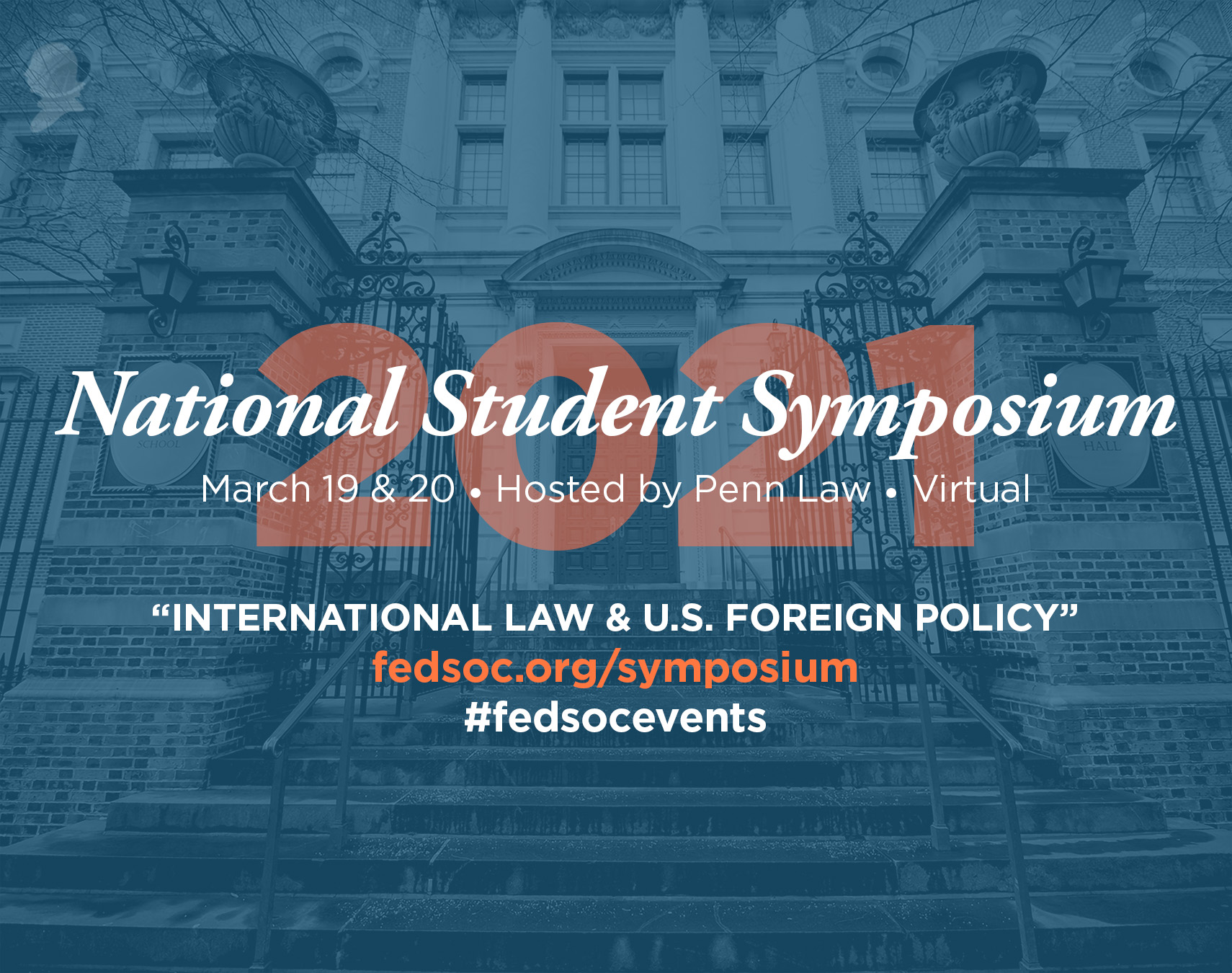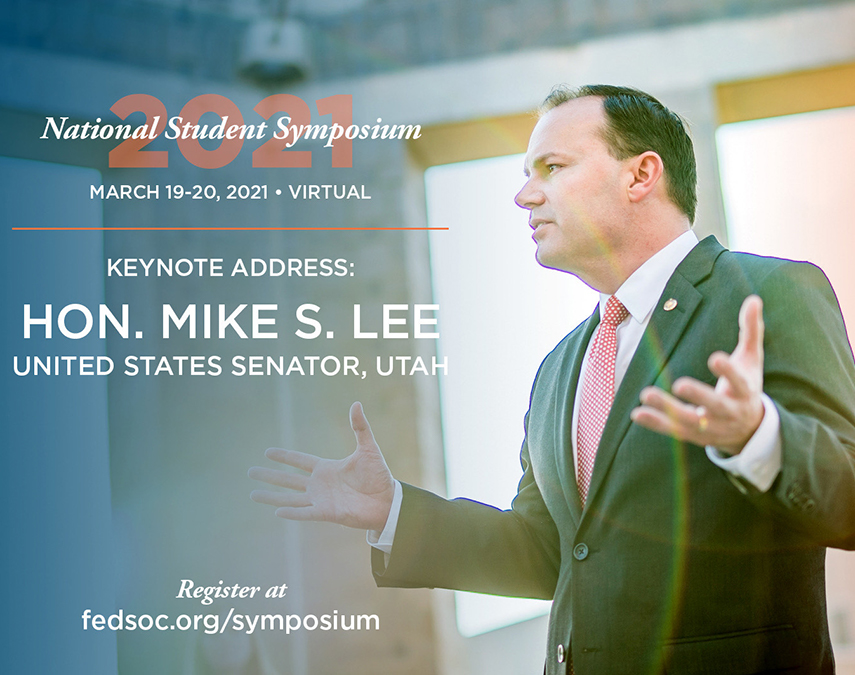Penn Law’s Federalist Society Chapter hosted the 40th Annual National Student Symposium on March 19-20, 2021. The topic of the Symposium was “International Law & U.S. Foreign Policy.”
Theme:
Titled “International Law and US Foreign Policy,” the Symposium focused on issues such as constitutional interpretation, international governance, trade, and human rights. For the past 20 years the U.S. has found itself engaging in a variety of conflicts across the globe, confronting the rise of geopolitical rivals in both military and economic influence, and most recently combating the global impact of COVID-19. The newfound focus on U.S. foreign policy has introduced an array of complex and contentious legal and political issues.
The Symposium hosted four panels and one debate on significant constitutional and policy issues that we believe will generate serious discussion among students, scholars, and practitioners:
- Panel I: The Role of International Law in U.S. Constitutional Interpretation
- Panel II: Trade and Sovereignty
- Panel III: Unilateral Presidential War Powers
- Panel IV: How Beneficial is International Human Rights Law?
- Debate: Is More Global Governance Necessary?
Videos from the Symposium are now available on the agenda tabs.
Back to top2021 National Student Symposium
| Topics: | Constitution • Foreign Policy • International Law & Trade • International & National Security Law |
|---|
Event Video
Description

In 1900, the Supreme Court stated that “international law is part of our law” in the Paquete Habana case. In recent decades, the status of customary international law in U.S. courts has been the subject of spirited debate. On the one hand, proponents of the greater international legal integration contend that rules of customary international law are rules of federal law, which apply directly in U.S. courts and preempt inconsistent state law even in the absence of federal authorization. On the other hand, opponents argue that, in the absence of congressional legislation or a U.S. treaty, rules of customary international law are generally not matters of federal law, and will therefore generally be governed by state law. This panel will discuss the constitutional foundations and implications of these two approaches.
Welcome and Opening Remarks
- Welcome: Andrea Leelike, President, Penn Law Federalist Society
- Opening Remarks: Dean Theodore Ruger, Dean, Penn Law
Panel I: The Role of International Law in U.S. Constitutional Interpretation
3:00 p.m. – 4:45 p.m.
- Prof. Lea Brilmayer, Howard M. Holtzmann Professor of International Law, Yale Law School
- Prof. William S. Dodge, John D. Ayer Chair in Business Law and Martin Luther King Jr. Professor of Law, UC Davis School of Law
- Prof. David H. Moore, Wayne M. and Connie C. Hancock Professor of Law; Associate Director, International Center for Law and Religion Studies, BYU Law
- Prof. Nicholas Quinn Rosenkranz, Professor of Law, Georgetown Law
- Moderator: Hon. Elizabeth Branch, United States Court of Appeals, Eleventh Circuit
* * * * *
As always, the Federalist Society takes no position on particular legal or public policy issues; all expressions of opinion are those of the speaker.
Speakers
2021 National Student Symposium
| Topics: | Foreign Policy • International Law & Trade • Law & Economics |
|---|
Event Video
Description

International trade has been a cornerstone of the postwar liberal order. Multilateral trade institutions, like the World Trade Organization, have been thought to promote growth and bind nations together in peaceful relations. But the beneficence of international trade has been challenged by the rise of populism and nationalism. It has been argued that trade eviscerates the middle class in developed countries, empowers nondemocratic nations, like China, which manipulate the rules, and undermines national sovereignty. This panel will assess the debate over international trade and consider alternatives to global trade institutions, like free trade treaties with individual nations.
Panel II: Trade and Sovereignty
5:00 p.m. – 6:45 p.m.
- Hon. Ronald A. Cass, President, Cass & Associates, PC
- Prof. Jacques deLisle, Stephen A. Cozen Professor of Law & Professor of Political Science; Director, Center for East Asian Studies, Penn Law
- Gary N. Horlick, Partner, Law Offices of Gary N. Horlick and Visiting Lecturer, Yale Law School
- Prof. Jide Okechuku Nzelibe, Benjamin Mazur Summer Research Professor of Law, Northwestern Pritzker School of Law; Affiliated Faculty, Ford Motor Company Center for Global Citizenship
- Moderator: Hon. Stephen A. Vaden, United States Court of International Trade
* * * * *
As always, the Federalist Society takes no position on particular legal or public policy issues; all expressions of opinion are those of the speaker.
Speakers
2021 National Student Symposium
| Topics: | Article I Initiative • Federalist Society |
|---|
Event Video
2021 National Student Symposium
Description
The Virtual Cocktail Reception is open to active student members only.
Registration for the opening reception will close at Friday, March 19th at 5:00 p.m. EST. We can't distribute the login info to anyone who registers after this time. Please note that registration for the rest of the Symposium will remain open throughout the weekend.
2021 National Student Symposium
| Topics: | Constitution • Foreign Policy • International Law & Trade • Separation of Powers • International & National Security Law |
|---|
Event Video
Description

Presidents of both parties now regularly claim the authority to take offensive military interventions without Congress’s agreement. The panel will consider to what extent such presidential unilateral action is consistent with the original meaning of the Constitution and whether the costs of such action, like political polarization, outweigh its benefits. The panel will also consider whether there are ways to reform the War Powers Act to make it a more effective instrument for requiring legislative deliberation before the United States commits to major military action abroad.
Panel III: Unilateral Presidential War Powers
1:00 p.m. – 2:45 p.m.
- John B. Bellinger III, Partner, Arnold & Porter
- Prof. Claire Finkelstein, Algernon Biddle Professor of Law and Professor of Philosophy; Director, Center for Ethics and the Rule of Law, Penn Law
- Prof. Saikrishna Prakash, James Monroe Distinguished Professor of Law, University of Virginia School of Law
- Prof. John Yoo, Emanuel S. Heller Professor of Law; Co-Faculty Director, Korea Law Center; Director, Public Law & Policy Program, Berkeley Law
- Prof. Ingrid Wuerth, Associate Dean for Research; Helen Strong Curry Chair in International Law; Director, Cecil D. Branstetter Litigation & Dispute Resolution Program, Vanderbilt Law School
- Moderator: Hon. Neomi Rao, United States Court of Appeals, District of Columbia Circuit
* * * * *
As always, the Federalist Society takes no position on particular legal or public policy issues; all expressions of opinion are those of the speaker.
Speakers
2021 National Student Symposium
| Topics: | Civil Rights • International Law & Trade • Law & Economics • International & National Security Law |
|---|
Event Video
Description

International human rights law has expanded greatly since World War II. Its advocates see it an instrument for improving the welfare of humankind, particularly those who live in nondemocratic nations. Its skeptics are less confident of its benefits because nondemocratic nations pay lip service to its ideals and yet violate its principles. Moreover, for democratic nations, some argue that international human rights agreements may prove of lower quality than the nations' own norms and detract from national sovereignty. This panel will debate the theory of international human rights law and consider its performance in such areas as the International Covenant on Economic Social and Culture Rights and the Rights of the Child Convention.
Panel IV: How Beneficial is International Human Rights Law?
3:00 p.m. – 4:45 p.m.
- Prof. Eugene Kontorovich, Professor of Law and Director, Center for the Middle East and International Law, George Mason University Antonin Scalia Law School
- Prof. John O. McGinnis, George C. Dix Professor in Constitutional Law, Northwestern Pritzker School of Law
- Prof. Michael Ramsey, Hugh and Hazel Darling Foundation, Professor of Law; Director, International & Comparative Law Programs, University of San Diego School of Law
- Prof. Beth Simmons, Andrea Mitchell University Professor in Law, Political Science and Business Ethics, Penn Law
- Moderator: Hon. Stephanos Bibas, United States Court of Appeals, Third Circuit
* * * * *
As always, the Federalist Society takes no position on particular legal or public policy issues; all expressions of opinion are those of the speaker.
Speakers
2021 National Student Symposium
| Topics: | Foreign Policy • International Law & Trade • International & National Security Law |
|---|
Event Video
Description

Advocates of global governance argue that more decisions need to be taken at the international level because such matters as pandemics and climate change create costly spillovers among nations. Regulation of such matters thus cannot as matter of economics or politics be successfully addressed only by the nation state. Opponents of global governance argue that such centralization of power detracts from national sovereignty and creates international institutions that have a democratic deficit and reflect their own interests rather than that of the world's citizenry. They also argue that global governance may hamper the United States' ability to provide effective leadership to solve world problems.
Debate: Is More Global Governance Necessary?
5:00 p.m. – 6:45 p.m.
- Prof. Oona A. Hathaway, Gerard C. and Bernice Latrobe Smith Professor of International Law and Counselor to the Dean, Yale Law School
- Prof. Jonathan R. Macey, Sam Harris Professor of Corporate Law, Corporate Finance, and Securities Law, Yale Law School
- Moderator: Hon. James C. Ho, United States Court of Appeals, Fifth Circuit
* * * * *
As always, the Federalist Society takes no position on particular legal or public policy issues; all expressions of opinion are those of the speaker.
Speakers
2021 National Student Symposium
Event Video
Description

The Joseph Story Award is given annually to a young academic (40 and under) who has demonstrated excellence in legal scholarship, a commitment to teaching, a concern for students, and who has made significant public impact in a manner that advances the rule of law in a free society. It is named for Justice Joseph Story, who was appointed to the Supreme Court at the age of 32, served as the first Dane Professor of Law at Harvard, and wrote the Commentaries on the Constitution of the United States. The winner is customarily announced and the award customarily presented at the National Student Symposium.
Keynote Address Featuring:
- Hon. Mike Lee, United States Senate, Utah
* * * * *
As always, the Federalist Society takes no position on particular legal or public policy issues; all expressions of opinion are those of the speaker.






























